11 Real-Life Tips For Eating More “Mediterranean” During Perimenopause
Plus, I am giving away 3 copies of the Generation M by Dr. Jessica Shepherd
Hello, everyone. I am writing from Sicily while on break between Brain Health Retreats. My brother got here yesterday and we are just about to leave on a road trip—a loose plan centered on visiting our grandparents’ hometown in the mountains. As it turns out, there’s an all-day festival there tomorrow to celebrate local foods, customs, and dialect. I can’t wait to tell you what we learn!
Last week Eastern Sicily was the perfect backdrop to learn brain health lessons here in the heart of the Mediterranean. A few highlights:
Tasting just-pressed olive oil on a farm that goes back generations and stewards thousand-year old olive trees
Sampling icy granita (a Sicilian frozen treat) made from flavonoid-rich foods like blackberries, pistachios, and lemon zest at the famous Caffè Sicilia in Noto
Feasting on seafood so fresh it needs just a quick bath in lemon juice and olive oil
Shopping at the outdoor food market with a local chef and choosing eggplant, pumpkin, and fresh mackerel to make for lunch
Visiting a biodynamic farm to learn about ancient grains and getting to marvel at an hours-old baby sheep brought to us in the arms of the farmer's 5-year old daughter
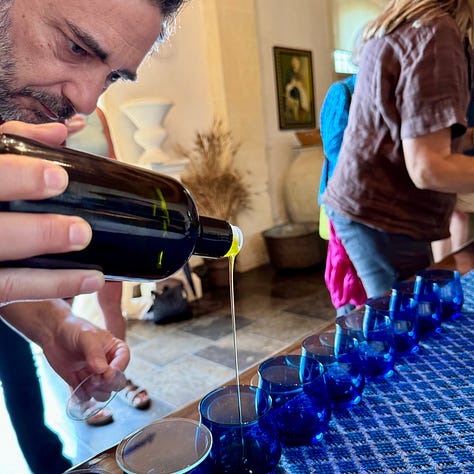
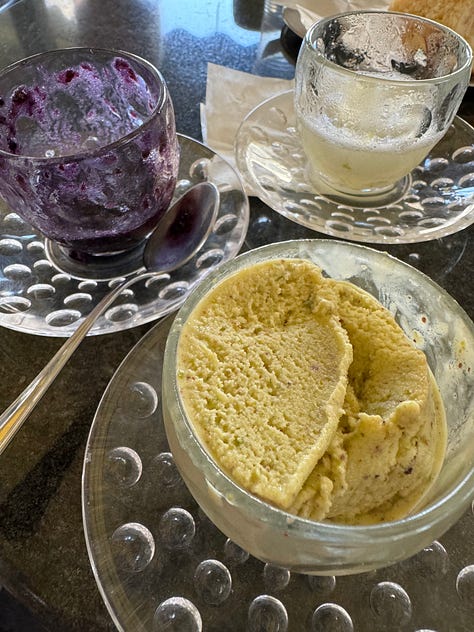
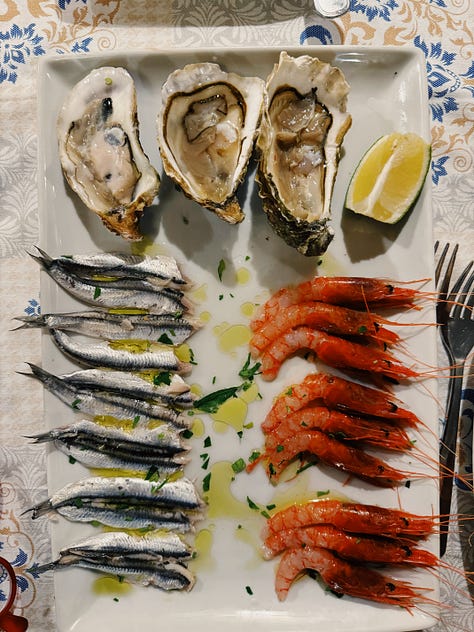
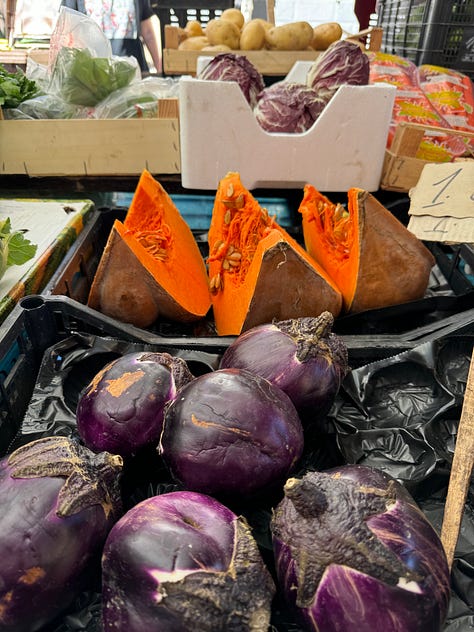


Want to join me on my next trip to Italy in 2025? Come with me to Puglia in April or Sardinia in May.
Today on the BHK newsletter, we are delving deeper into the Peri-Medi diet, which I wrote about last week. I am sharing some practical tips about how to adapt the Mediterranean diet in real life, in your own kitchen and when you eat out. These are open access for everyone, so feel free to share!
And, for paying subscribers, I am very excited to be giving away 3 copies of Generation M: Living Well in Perimenopause and Menopause by Dr. Jessica Shepherd. This is the book I wish I would have had to give to each perimenopausal woman I saw in my former life as a menopause doctor. Look for details about how to win a copy at the bottom of this post.
World Menopause Day was last week
In the U.S., menopause is finally getting the attention it deserves. On World Menopause day last Friday, a lot of my friends and colleagues were sharing tons of fantastic information. Menopause experts have become activists! They are taking to social media to educate women about this life transition: recognizing symptoms, finding a menopause-friendly physician, pros and cons of HRT, and all the things one can do to sleep better, have more energy, and quell symptoms such as mood swings and hot flashes. For a list of articles I have shared about menopause, click on the home page here and type “menopause” into the search bar. I’ve bookmarked a few for you here.
Since being in Sicily, I started thinking about the differences between cultural attention to menopause in the US versus Italy, where there doesn’t seem to be the same sort of groundswell around menopause. Why do the Italian women I know seemingly experience menopause differently? Is it because Italian women endure less severe and/or fewer symptoms during the perimenopause? Is there better access to education and treatment? Or, does the Italian acceptance of aging in general spill over into the perimenopausal years?
There are definitely fewer barriers to obtaining a prescription for hormone therapy in Italy. For example, I can walk into any pharmacy in Italy and purchase the same HRT I take at home without a prescription. It is a lot more affordable, too. At home I pay $275 per month; here the same prescription costs just €13 (about $15).
I started digging into PubMed (a medical journal search engine) to see if the Mediterranean diet and lifestyle has been well-studied in perimenopausal women. As it turns out, there are a number of studies that support a Mediterranean-style diet as a way to alleviate symptoms. That’s when I had an epiphany:
The same Medi diet with proven heart, brain, and longevity benefits has also been shown to alleviate perimenopausal symptoms. Plus, the Mediterranean diet is one of the few proven to protect the brain from Alzheimer’s. So when a perimenopausal woman adapts the Mediterranean diet to fit her needs, she is laying a foundation at mid-life that will protect the brain from both heart disease and dementia.
You can read more of the details of how my Peri-Medi Diet differs from the traditional Mediterranean diet here. While I designed these strategies for perimenopausal women, they work for everyone—male or female, menopausal or not—who wants to age with strong bones, a healthy heart, and a sharp brain.
11 Real-Life Tips For Eating More “Mediterranean”
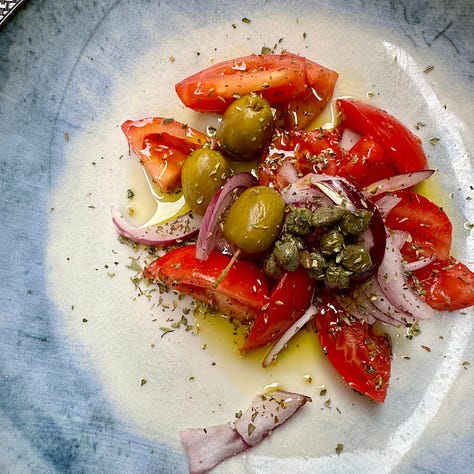
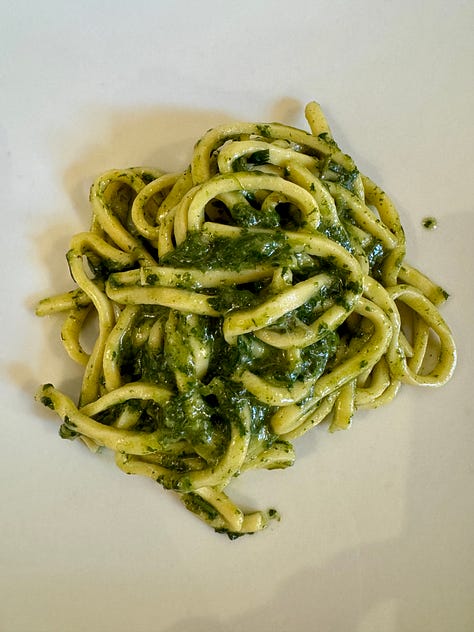
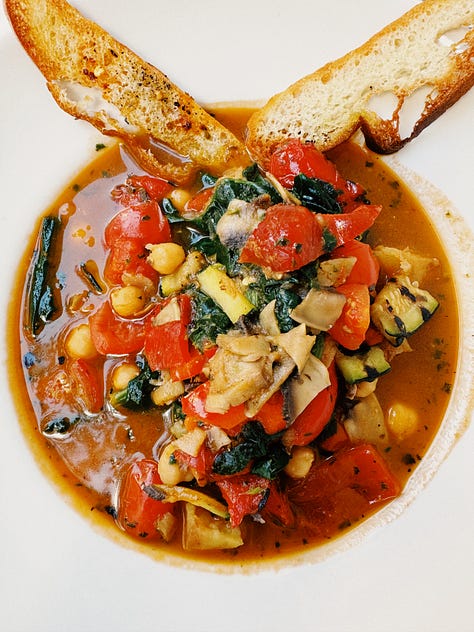
Perimenopause is the perfect opportunity to move towards a more Mediterranean style of eating. But don’t feel like you have to overhaul your diet all in one go. It’s far easier, not to mention more enjoyable and successful, to choose one category to work on each week. Start now and in just a few months you’ll be harnessing the science-based Medi diet and lifestyle to smooth over the perimenopausal years. Plus, these strategies work for everyone—male or female, memopausal or not—to strive for aging with strong bones, a healthy heart, and a sharp brain.
Use extra-virgin olive oil for almost everything. EVOO provides an optimal fat profile for the heart and brain (mostly mono- and polyunsaturated fats) along with potent antioxidants called polyphenols. Use an “everyday” good-quality supermarket brand for cooking at low to moderately high heat and baking, and a “high-end” best quality EVOO for drizzling on finished dishes and making salad dressings, pesto, and sauces. Find buying tips below and in the Olive Oil chapter of my book.
Rethink snacking. Mediterranean women are more likely to snack on nuts and olives than packaged things like chips, pretzels, crackers, and bars. These Medi staples provide brain-friendly fats, fiber, and brain health nutrients. Make sure you are getting enough protein with each meal (learn how to calculate this here) to reduce the tendency to snack between meals. And pay attention to your “food environment;” rid your home and workplace of the unhealthy snacks that may tempt you.
Get rid of white flour foods. Whole grains make up the backbone of the Mediterranean diet, while in the U.S. 97% of the grains we eat come from processed white flour in the form of bagels, bread, flour tortillas, English muffins, packaged baked goods, and the list goes on and on. Instead, seek out truly whole grain products by carefully reading labels. Select dense, chewy, country-style loaves without added sugar or butter. Experiment with bulgur, barley, farro, couscous, and whole-grain pasta. Below, find tips on buying and cooking with pasta made from whole grains, pulses, and more.
Eat a salad every day. This could be a three-ingredient salad before a meal (greens, chopped apple, walnuts) or a substantial meal in a bowl. Choose dark leafy greens in season whenever possible. Ditch store-bought salad dressings; instead, drizzle with your best EVOO with a squeeze of lemon or vinegar.
Cook with nutrient-dense flavor bombs. Capers, red onions, lemon and orange zest, and spices (including red pepper flakes, cumin, oregano, cinnamon) provide antioxidants in the form of flavonoids—brain health nutrients that block oxidative stress, a root cause of inflammation in the body and the brain.
Count plants, not calories. Shoot for eating 30 different types of plant foods each week. Branch out from your usual faves (broccoli and apples are mine!) to increase the diversity of vegetables, fruits, nuts, seeds, and legumes you consume. Based on data from the British and American Gut Health Project, 30 unique plants a week is a good place to start.
Embrace legumes. If you already eat beans and legumes, shoot for at least three servings a week of legumes. (One serving is ½ cup cooked.) If you don’t, introduce them slowly so your body can adapt. Fiber-rich foods like legumes help stabilize blood sugar, alleviate mood swings, curb appetite, and reduce harmful blood cholesterol. Lean on canned beans for convenience, if you like, but seek out low sodium beans in BPA-free cans, cartons, or jars. Have a few easy bean soup recipes in your back pocket, like Creamy Cannellini Bean Soup in my book and the Black Bean Soup, below. Add remember: soy foods like edamame are legumes, too.
Eat less meat. In the entire month I have been in Italy I have eaten red meat just once. The Mediterranean diet is mostly pescatarian—plant-based whole foods, fish, and seafood. When you do eat meat and poultry (which can be helpful to meet protein needs), choose lean, high-quality products in small portions (3- to 4-ounces). Save red meat for occasional consumption or use meat as a condiment, accompanied by lots of vegetables, as in stews, stir-fries, and soups.
Eat more fish, aiming for two to three servings a week. Get to know the fishmonger at the grocery store and seek out the best product you can afford. Reference the Fish & Seafood pyramid in my book as guide to the brain-healthiest fish: low in environmental toxins, high in omega-3s (DHA and EPA), and planet-friendly. Get familiar with the tinned fish aisle of the supermarket; these brain foods also provide calcium to protect your bones. Anchovies, sardines, and mackerel are good choices. Check out my tinned fish buying guide, below, and learn how to fold them into your cooking.
Examine your relationship with alcohol. It’s no secret that alcoholic beverages can trigger hot flashes and disrupt sleep cycles. Plus, daily drinking has been shown to shrink brain volume over time. If you drink, keep consumption under four 5-ounce servings per week. Enjoy a drink early in the evening, then switch to a non-alcoholic beverage instead. Try not to consume alcohol within 3 hours before bed. Take a day, week, or month off and monitor your perimenopausal symptoms. Most women will experience fewer and less severe vasomotor symptoms, and have better quality sleep. Learn more about to create your own low- or no-alcohol program, below.
Cut out sugar- and artificially-sweetened drinks. Drinking things like soda, diet soda, juice, energy drinks, and sweetened sparkling products have been shown to exacerbate blood sugar fluctuations and weight gain at mid-life and contribute to an increased risk of dementia later. Instead, drink coffee (regular or decaf), “real” tea (green, black, white, oolong), and water. Work on weaning off sweeteners and processed creamers in your coffee, too. If you notice that the caffeine in your coffee is triggering hot flashes, swap in tea instead for a lower caffeine dose and, in the case of matcha, a gentler delivery system.
Book Giveaway: Generation M: Living Well in Perimenopause and Menopause by Dr. Jessica Shepherd
There are so many things I love about Jessica’s new book. It’s meticulously science-based yet feels like a friend (who happens to be a brilliant MD) is giving you the scoop on perimenopause and beyond. It has a well-balanced discussion of the pros and cons of HRT. And it focuses on low-effort/high-yield lifestyle tweaks that can really pay off.
Here’s how to enter to win a copy of Generation M
You must be a paying subscriber to this newsletter.
Leave a comment here about something you learned about the Mediterranean diet, something you want to change in your diet or lifestyle, or a tip you have found helpful for eating during the perimenopause.
Forward this newsletter to a friend who may be experiencing perimenopause.
This giveaway is available for paying subscribers to this newsletter who live in the U.S. Comments close on Friday, November 1 at 12 pm MST. I’ll choose 3 winners randomly and notify them by email. To claim your copy, you’ll need to get back to me within 24 hours.
That’s all for today. Next week I’ll be immersed in the Western Sicily Brain Health Retreat and I can’t wait to meet everyone.
Love,
Annie
For information about Brain Health Retreats, go to the RETREATS tab on the BHK homepage. Here are direct links for Costa Rica (1 casita left), Sardinia (1 spot left), and Puglia.











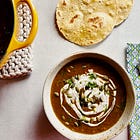

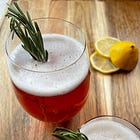



I need to eat more seafood!
I have learned so much about the Mediterranean lifestyle on this Brain Health Retreat in Palermo. They eat hyper seasonal fresh food here. The food tastes soo delicious when it is in season and picked fresh from the garden that day. They have such a great community here. People come together to eat, socialize and have so much laughter on a daily basis. It’s been an out of this world experience in this brain retreat!! Highly recommend it for anyone that is considering it. You will not regret it! Annie is amazing and such a wealth of knowledge!